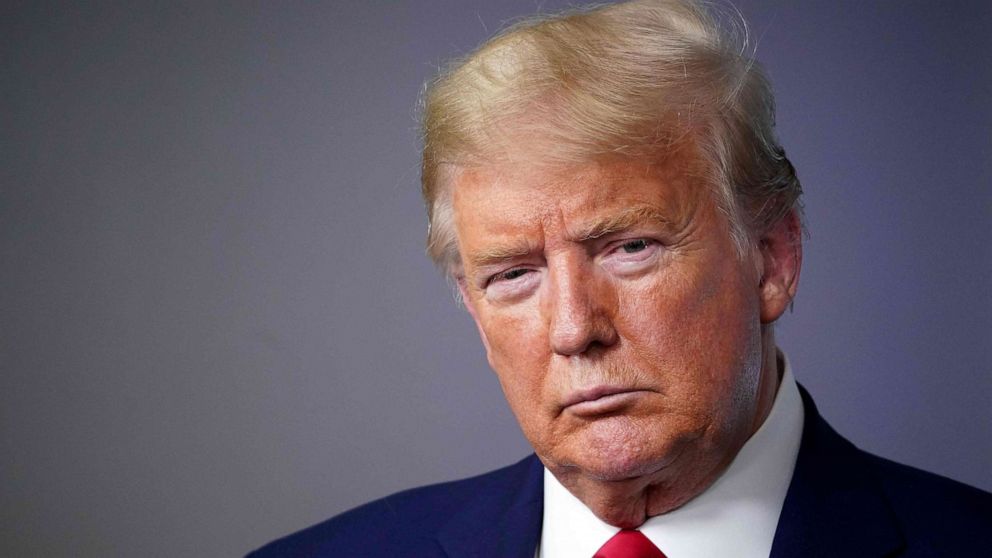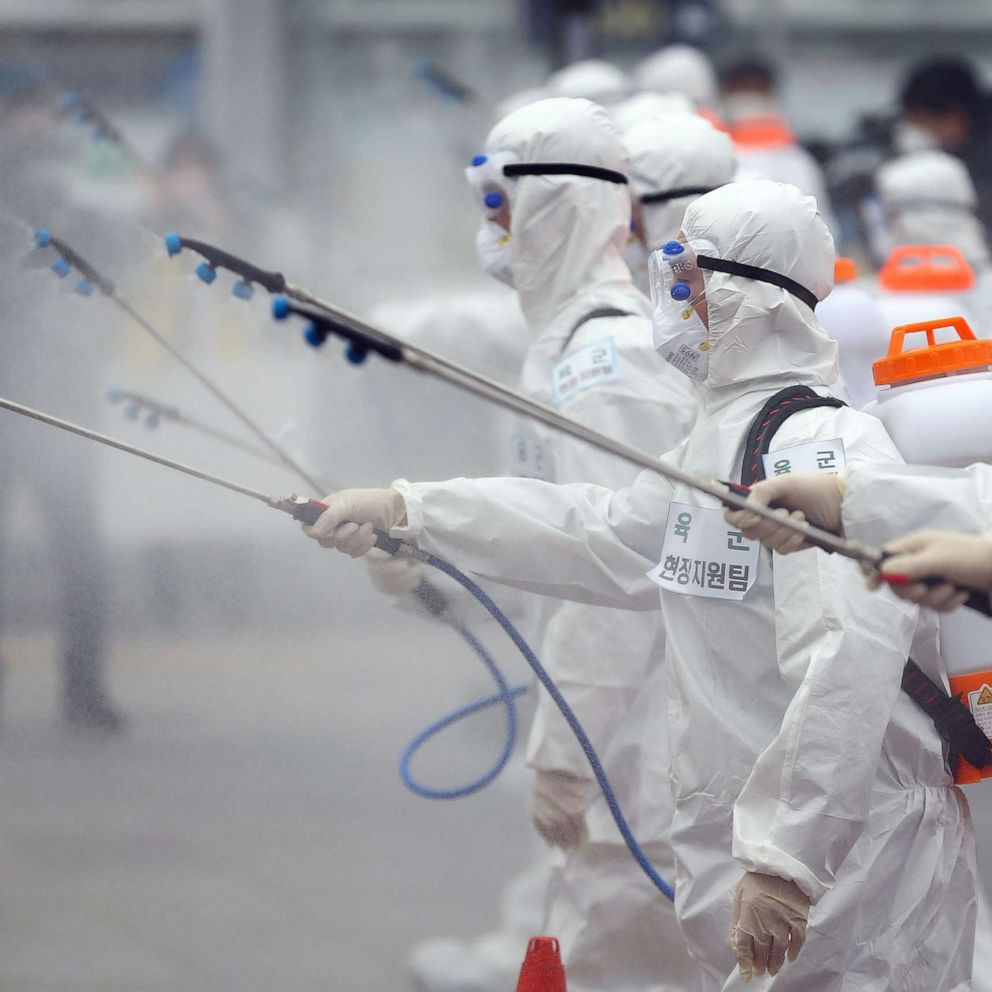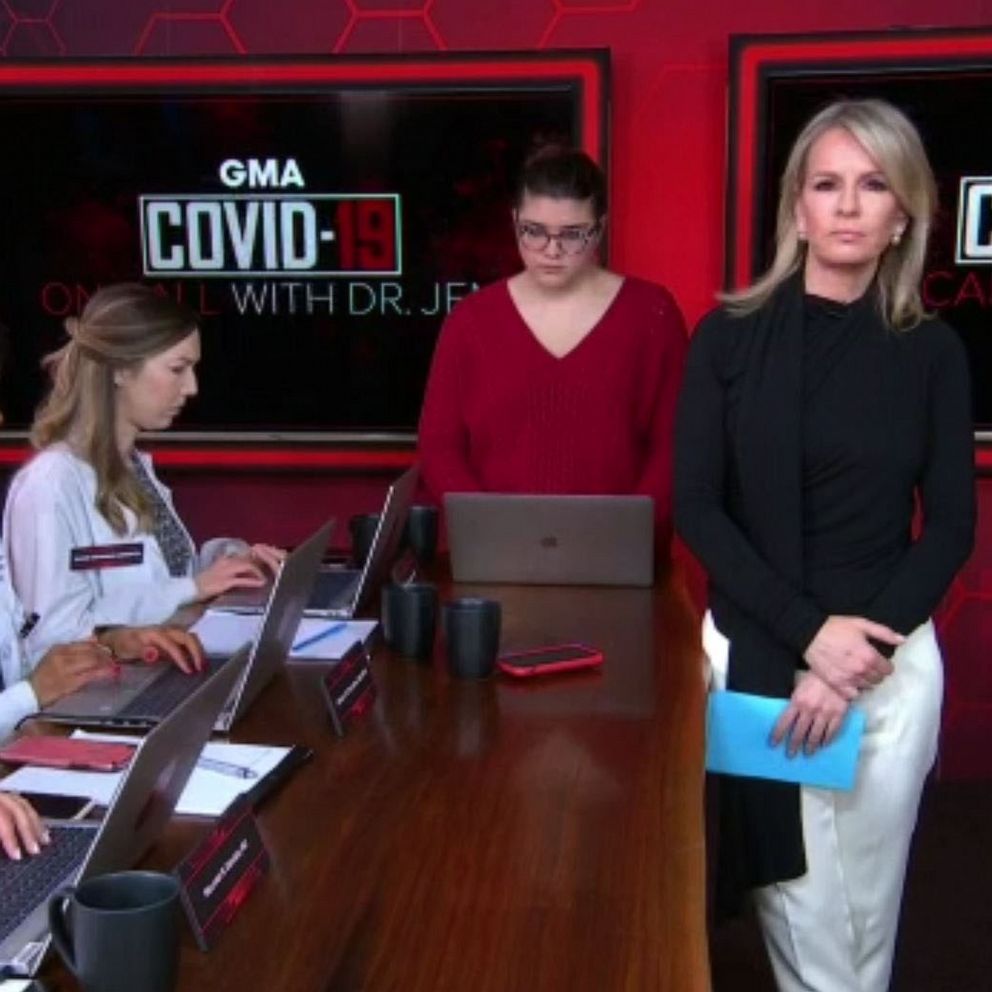Coronavirus government response updates: Grim Trump, doctors say prepare for potential 100K to 240K deaths
The federal government has been rolling out its response to the novel coronavirus crisis, trying to slow the spread and prop up the economy, amid a volatile stock market and record unemployment numbers.
After the nation’s top health officials warned the death toll from COVID-19 could reach 200,000, even with mitigation efforts, President Donald Trump has abruptly changed his messaging and extended the White House coronavirus guidelines through the month of April.
While last week he stressed a need for Americans to get back to work and said he envisioned "packed churches" on Easter, the president now says the COVID-19 death toll will peak around the holiday and signaled normalcy may not return until June 1 or later.
Tune into ABC at 1 p.m. ET and ABC News Live at 4 p.m. ET every weekday for special coverage of the novel coronavirus with the full ABC News team, including the latest news, context and analysis.
Here are Tuesday’s most significant developments in Washington:
- Trump warns Americans of "very painful" two weeks ahead
- Fauci says be prepared for 100,000 deaths
- White House reveals details on death-estimate models that go up to 240,000 deaths, driving President Trump's decision to extend the guidelines until April 30
- Pelosi looking to next COVID-19 relief package with focus on infrastructure
Here are the latest developments in the government response:
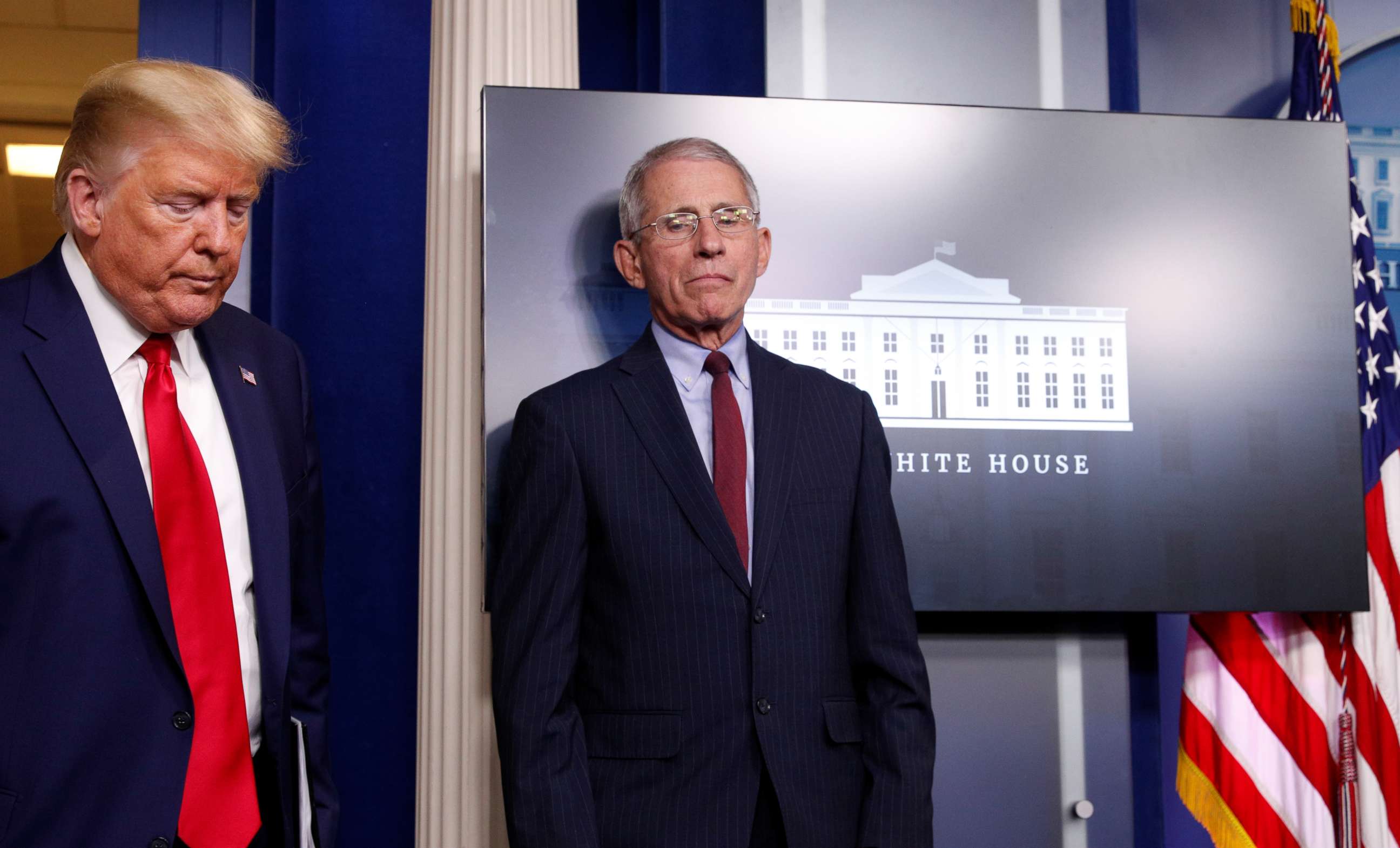
Trump says White House guidelines a ‘matter of life and death’, Fauci and Birx predict at least 100,000 Americans will die, maybe as many as 240,000
In an abrupt shift from his messaging last week that downplayed the impact of the novel coronavirus and urged Americans to return to work, President Donald Trump opened his daily briefing Tuesday saying the extension of the White House social distancing guidelines through April represents "a matter of life and death."
"In a few moments, Dr. Birx will explain the data that form the basis for our decision to extend the guidelines and Dr. Fauci will explain why it's absolutely critical for the American people to follow the guidelines for the next 30 days," the president said. "It's a matter of life and death, frankly."
Trump predicted as things get better, "it's going to be like a burst of light," but acknowledged the next few weeks will be "painful."
"Hopefully as the experts are predicting, a lot of us are predicting having studied it so hard, going to start seeing some real light at the end of the tunnel, but this is going to be a very painful two weeks," Trump said, appearing to refer to the peak of the death toll, which some models have signaled will hit mid-April.
Trump, who grew up near Elmhurst Hospital, got quiet and solemn as he described watching doctors and nurses heading into work at the Queens hospital that has been one of the hardest hit by the coronavirus crisis.
It was the most emotion Trump has shown during the daily briefings given at the White House and marked a clear change in tone.
"I watched as doctors and nurses went into a certain hospital in Elmhurst this morning. I know Elmhurst -- Queens, that’s -- I grew up right next to it. I know the hospital very well. I've been seeing it all my life, my young life," the president said. He described seeing the "scenes" of truck trailers that are being used as freezers for bodies of patients who have died from coronavirus.
"And I watched the doctors and the nurses walking into that hospital this morning. It's like military people going into battle, going into war. The bravery is incredible. And I just have to take my hat -- I would take my hat -- if I were wearing a hat, I'd rip that hat off so fast and I would say 'you people are just incredible.' They really are. They’re very brave," the president said.
Dr. Deborah Birx, the White House's coronavirus response coordinator, utilizing a slideshow and flanked by visual models, then explained what drove the White House’s decision to extend the guidelines.
Introducing studies from the University and Washington and London Imperial College, Birx said, their models showed "what social distancing would do, what would happen if people stayed home, what would happen if people were careful every day to wash their hands and worry about touching their faces -- what an extraordinary thing this could be if every American followed these."
Birx emphasized that without mitigation efforts, between 1.5 million and 2.2 million people in the U.S. would die. Even with social distancing, models show "100 to 200,000 deaths, which is still way too much," Birx acknowledged.
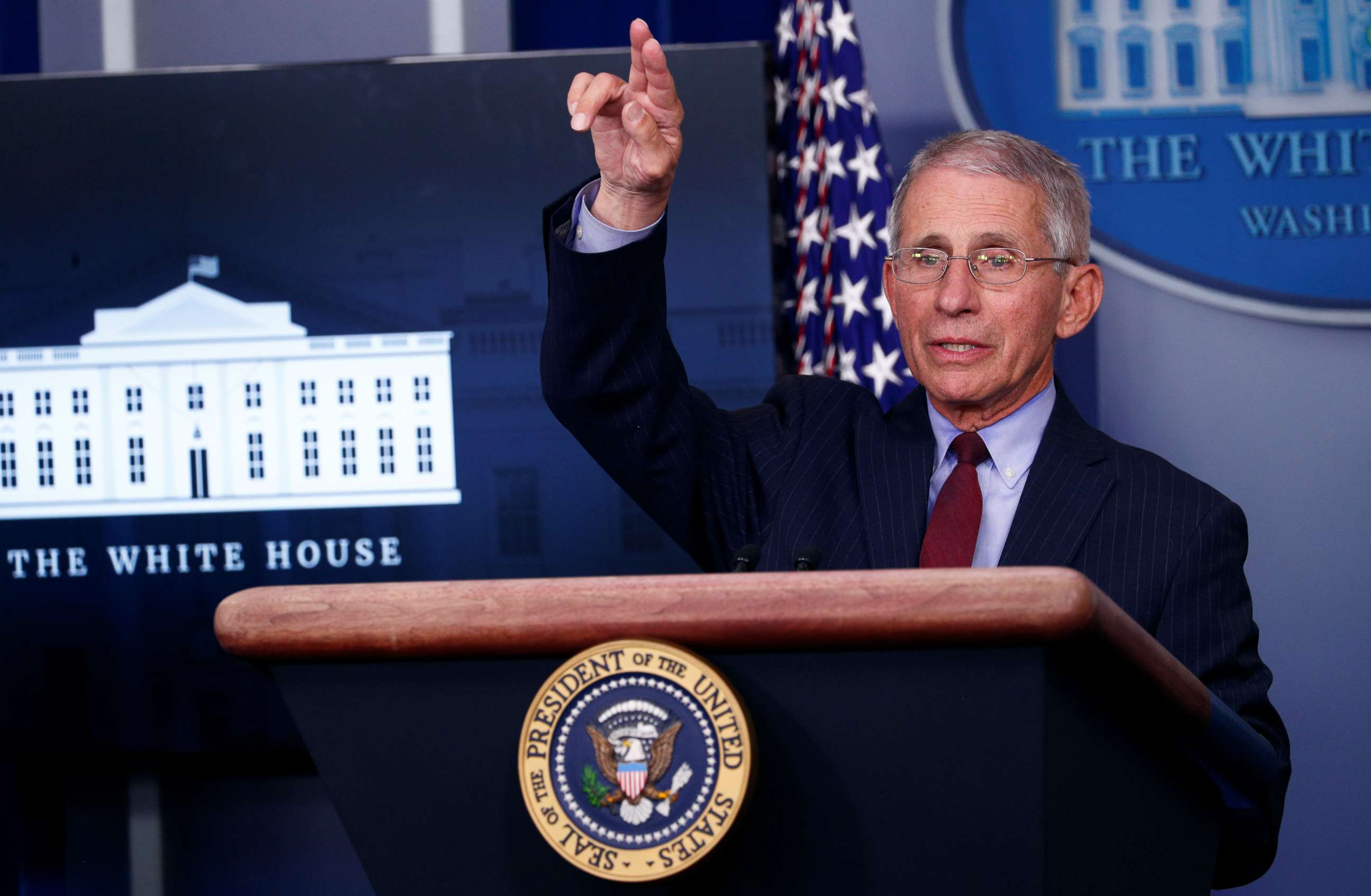
"I know it's stressful to follow the guidelines, but it is more stressful and more difficult to the soldiers on the front line," she added.
"There's no magic bullet, there’s no magic vaccine or therapy, it's just behaviors," Birx said. "Each of our behaviors translating into something that changes the course of this viral pandemic over the next 30 days."
Dr. Anthony Fauci, the nation's top infectious disease expert and a key member of the coronavirus task force, urged Americans not to take their foot off the accelerator with regards to mitigation efforts like social distancing and staying home.
"This is tough. People are suffering, people are dying. It's inconvenient from a societal standpoint, from an economic standpoint, to go through this, but this is going to be the answer to our problems," Fauci said.
"The 15 days that we had of mitigation clearly have had in effect, although it's tough to quantitate it," Fauci said, urging people that it's more important than ever to keep it up rather than let their guard down. "The reason we feel so strongly about the necessity of the additional 30 days is that now is the time ... not to take your foot off the accelerator ... but to just press it down on the accelerator," Fauci said.
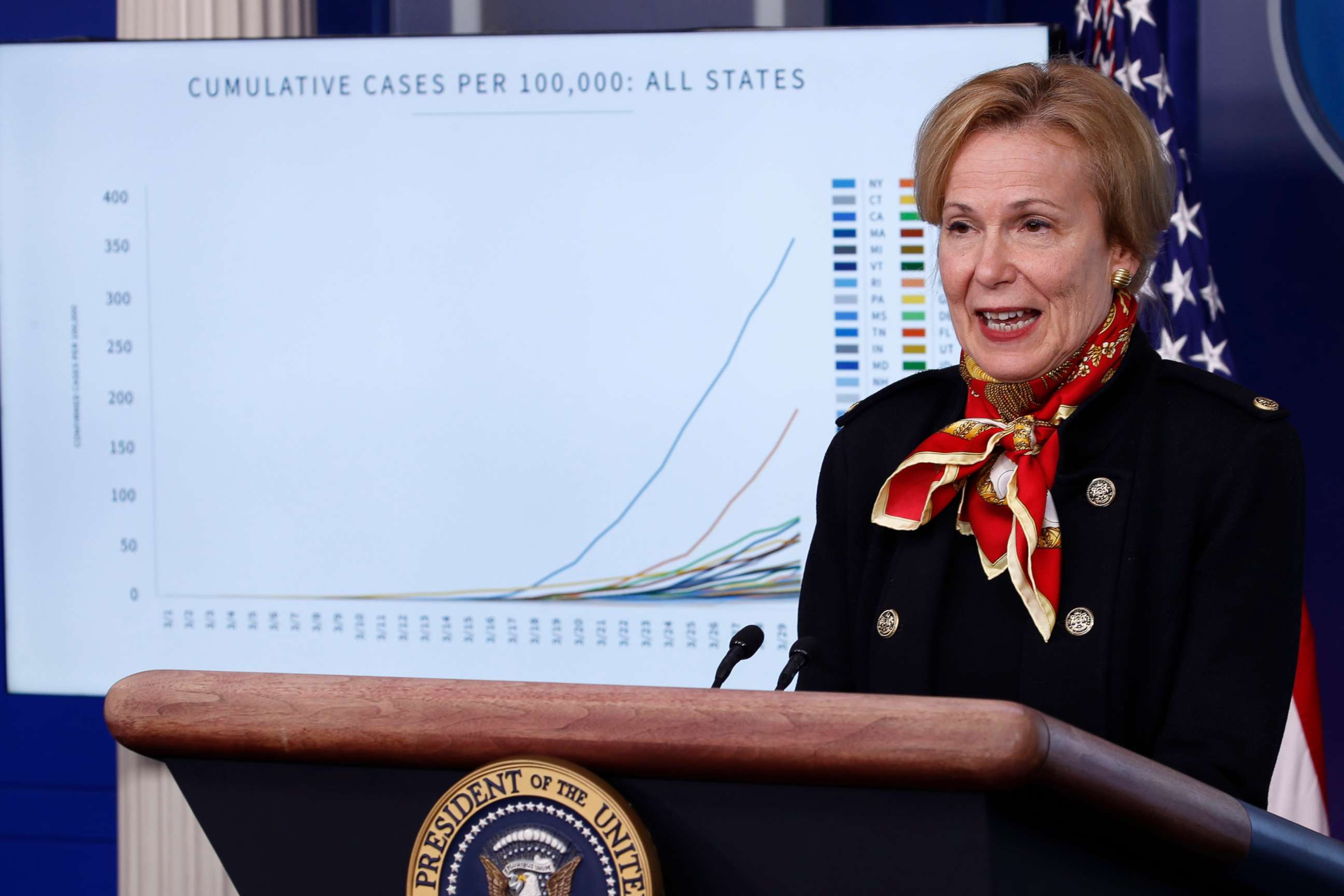
Fauci said they have seen "inklings" of fewer cases per day in New York but said Americans should brace themselves to continue to see deaths rise because of the timeline of the virus and know that mitigation efforts are still working.
"So what we are going to see, and that's why we have to brace ourselves, in the next several days to a week or so, we're going to continue to see things go up. We cannot be discouraged by that because the mitigation is actually working and will work," he said.
Asked if Americans should be prepared for 100,000 Americans to die from COVID-19, Fauci said point-blank, "The answer is yes."
"As sobering a number as that is, we should be prepared for it," Fauci continued. "Is it going to be that much? I hope not. And I think the more we push on the mitigation the less likelihood it would be that number -- but being realistic we need to prepare ourselves that that is a possibility that that is what we will see."
"We gotta brace ourselves: in the next several days to a week or so, we're going to continue to see things go up. We cannot be discouraged by that. Because the mitigation is actually working, and will work," he said.
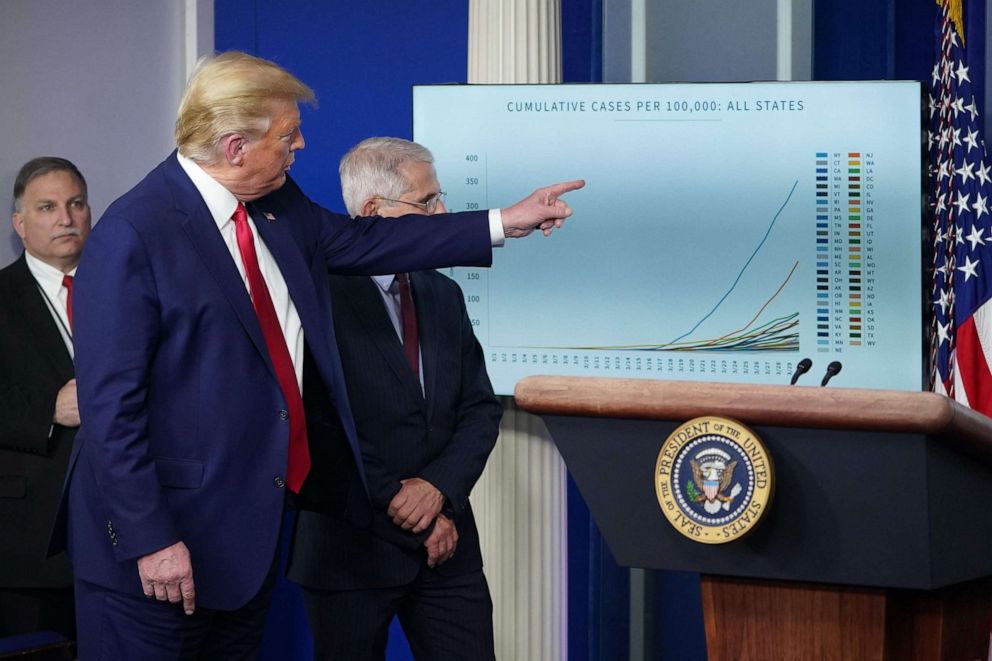
Trump said it was "very sobering" to see that 100,000 was the predicted minimum death toll, but said that it is still "a very low number."
"A hundred thousand is, according to modeling, a very low number. I asked this a while ago, they said, ‘it's unlikely you will be able to attain that’ -- I think we are doing better than that," the president said, emphasizing that 2.2 million people could’ve died if the U.S. did "ride it out" without mitigation efforts.
On wearing masks, Trump said, "if people want to do it, there's certainly no harm to it," before suggesting people "use a scarf" so that medical masks can go to hospitals.
Trump also said the federal government is distributing 10,000 ventilators, key life saving devices in the fight against coronavirus that many states have said they need, while acknowledging that the "surge is coming."
"We have almost 10,000 ventilators that we have ready to go. We have to hold them back because the surge is coming and it's coming pretty strong," Trump said, adding that ventilators are going to Michigan, Louisiana, New York and New Jersey.
Patients who are hardest hit by coronavirus end up in Intensive Care Units on ventilators to allow them to breathe, and states with hot spots have warned that if they don't have enough, they risk facing a situation where they have to choose who lives and who dies.
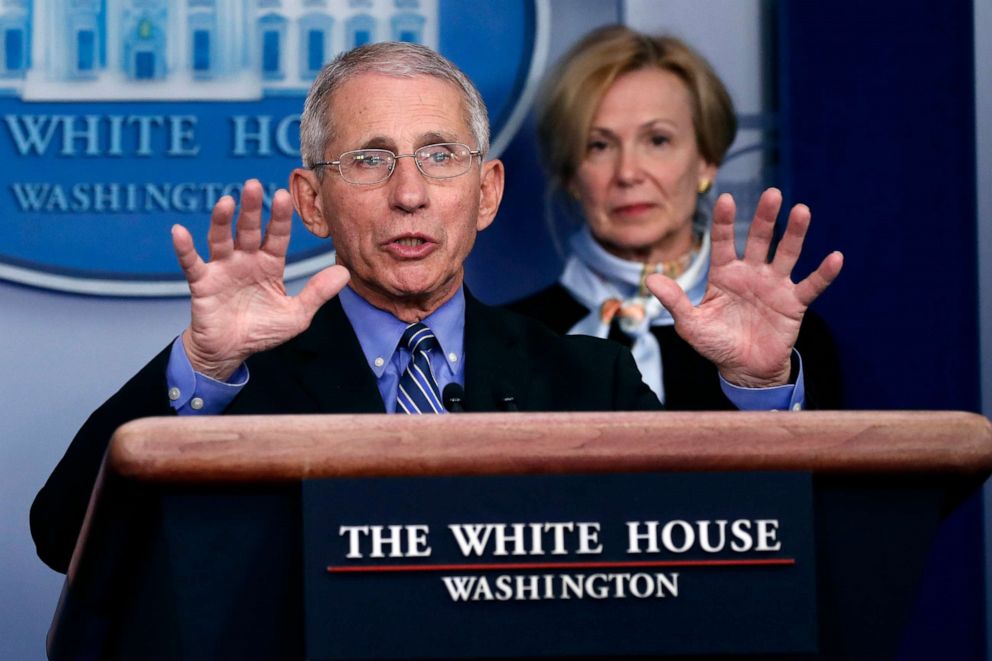
Fauci says masks for everyone "under very active consideration"
Dr. Anthony Fauci, director of the National Institute of Allergy and Infectious Diseases and the top health expert on the coronavirus task force, says the recommendation of masks for all Americans is "under very active consideration."
Fauci told CNN this morning that the issue of facial coverings will be discussed at the task force meeting "today" but that the determination could only come "when we have enough" for health care workers.
"The idea of getting a much more broad community-wide use of masks outside of the health care setting is under very active discussion at the task force. The CDC group is looking at that very carefully," Fauci said. "The thing that has inhibited that a bit is to make sure we don't take away the supply of masks from the health care workers who need them."
"But when we get in a situation where we have enough masks, I believe there will be some very serious consideration about more broadening this recommendation of using masks. We're not there yet, but I think we're close to coming to some determination," Fauci added.
"If, in fact, a person who may or may not be infected wants to prevent infecting somebody else, one of the best ways to do that is with a mask, so perhaps that's the best way to go," Fauci told CNN. "That's under very active consideration. We'll be discussing it today, this afternoon, at the task force meeting."
His comments follow reporting in the Washington Post that the Centers for Disease Control and Prevention is considering recommending general public wear face coverings for all Americans in public, after initially telling Americans they're only recommended for health care workers.
Hospitals across the country have sounded alarms in recent weeks that they lack the personal protective equipment like masks to treat COVID-19 patients.
Asked Monday about the potential for all Americans to start wearing masks, President Trump said it’s something he and the task force could discuss for the short-term.
"We haven't discussed it to that extent, but it's certainly something we could discuss," Trump said. "We’re not going to be wearing masks forever, but it could be for a short period of time after we get back into gear."
Fauci also said the data is starting to show "glimmers" that social distancing is taking an effect.
"If you look now, we are starting to see glimmers that that is actually having some dampening effect," he said of mitigation efforts. "We hope, and I believe it will happen, that we may start seeing a turnaround, but we haven't seen it yet."
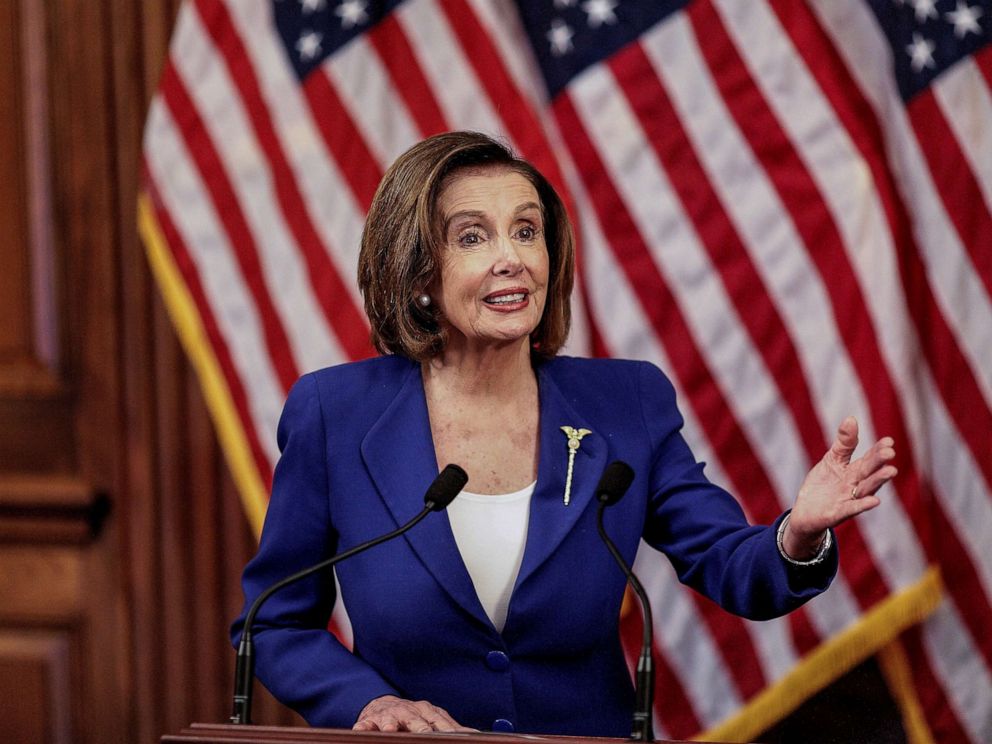
Tom Inglesby, director of the Johns Hopkins Center for Health Security, called on the CDC Sunday to make the recommendation for mask use widespread in an effort to slow the spread.
"It's critical that all medical masks (N95, surgical, procedural) be given to health care workers and emergency personnel," Inglesby said in a Twitter thread. "But members of the general public should wear non-medical fabric face masks when going out in public in one additional societal effort to slow the spread of the virus down."
He pointed to South Korea, China and other countries where outbreaks appear managed and face masks are widely used in public.
While Inglesby also suggested people might make their own masks at home using washable materials, other officials have cautioned for weeks that if a mask isn't fitted correctly, it won't be effective.
Pelosi previews 4th COVID-19 package with focus on infrastructure, Trump weighs in on Twitter
House Speaker Nancy Pelosi said on Tuesday that the priorities for the next COVID-19 relief package should include more protections for front line health care workers, with an added infrastructure element to boost the nation’s water systems and broadband capabilities.
"We have agreed in our negotiations that everything that we're doing is specific to the coronavirus challenge," Pelosi said on MSNBC's "Morning Joe."
"And that would be, infrastructure for water systems are so essential. Broadband, because so many people are relying on telecommunication and social media and the rest. But I do think that we've acted in bipartisan ways every step of the way, and we will continue to do so. We may have our differences but we have to find our common ground," she added.
Pelosi, who last week instructed her committees to begin coming up with proposals for the next relief bill, said on Monday that it is likely the next bill won’t get a vote until mid to late April, as the House is not scheduled to return until at least April 20th, and she has ruled of the possibility of remote voting.
"I would not suspect that we would have any bipartisan legislation before we return after Easter and Passover. But we’re getting ready -- and in some cases we are ready," Pelosi said on a call with reporters.
She also said she wants to see an increase in aid for states and include another round of direct cash payments in the next package.
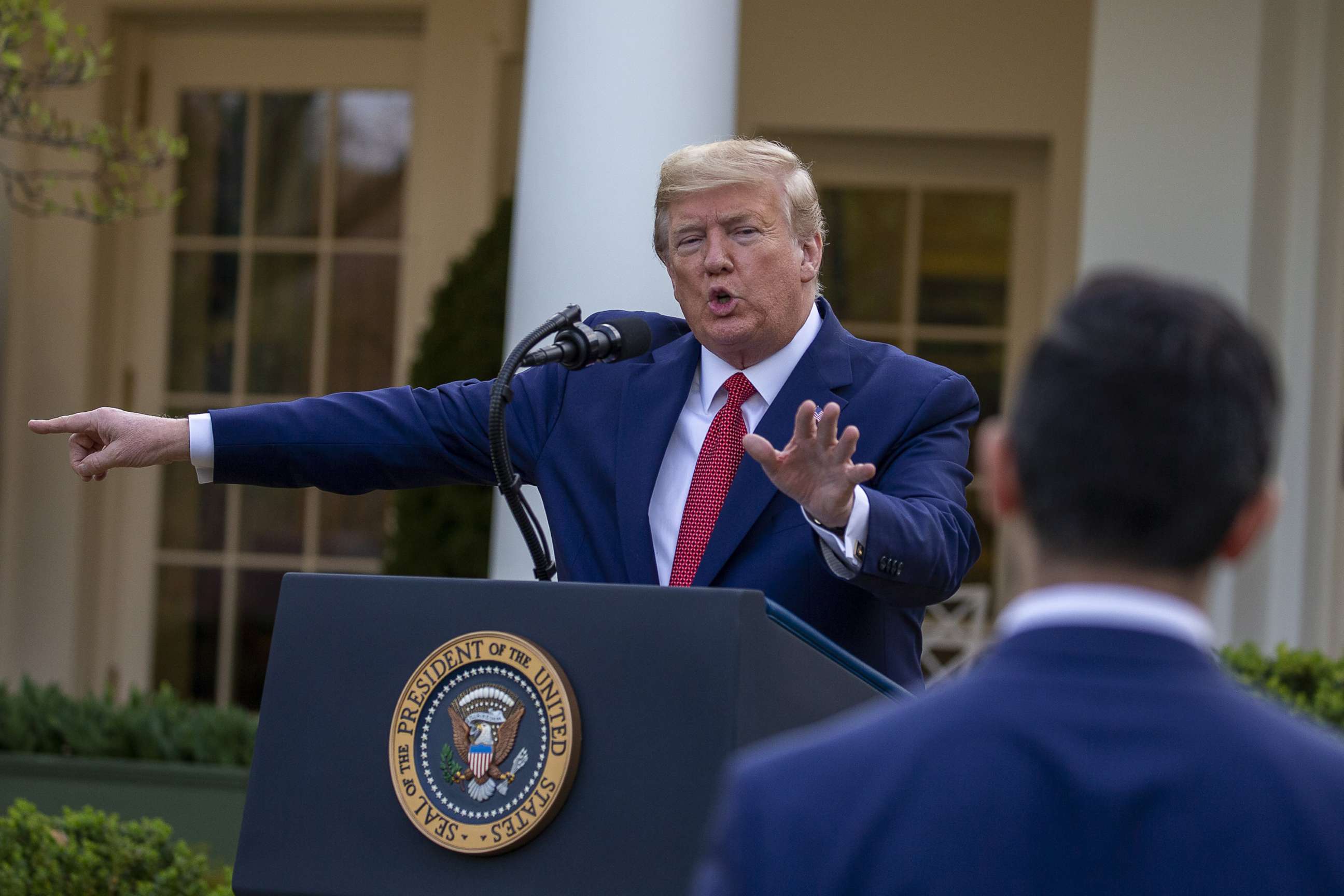
Following Pelosi’s interview this morning, President Trump took to Twitter to make some snide remarks at the Speaker, saying he tuned in to see "what moves she was planning to further hurt our Country" -- even after he has called on others to put partisanship politics aside.
The president and the speaker haven’t spoken since October.
Trump later weighed in from the White House on "phase four," tweeting that "this is the time" for Congress to pass an infrastructure bill since interest rates are low.
Senate Majority Leader Mitch McConnell, meanwhile, signaled he's not ready to begin talks on a fourth relief package.
"I think we need to wait a few days here, a few weeks, and see how things are working out," McConnell said this morning on "The Hugh Hewitt Show."
"I’m not going to allow this to be an opportunity for the Democrats to achieve unrelated policy items that they would not otherwise be able to pass," he added.
Pompeo appears to drop the term "Wuhan virus," speaks broadly of disinformation campaigns on COVID-19
During a briefing at the State Department, a now weekly occurrence with fewer reporters allowed in the room amid social distancing guidelines, Secretary of State Pompeo did not use the term "Wuhan virus" as he consistently has for a month now, signaling a slight softening of position towards China.
When asked about disinformation from other countries, Pompeo did not call out China but instead talked broadly about the need to trust data from all countries.
"This is the reason disinformation is dangerous. It's not because it's bad politics, it's because it puts lives at risk if we don't have confidence in the information that's coming from every country. So I would urge every nation: Do you best to collect the data and do your best to share that information," he said.
Asked later whether the U.S. trusts the data coming from China, Pompeo deflected the question to the Centers for Disease Control and Prevention and the department of Health and Human Services -- even after openly questioning their data last week.
When President Trump was questioned about China and other countries engaging in disinformation campaigns on Fox News Channel’s "Fox and Friends" Monday, he said, "They do it, we do it."
"We call them different things and I make statements that are very strong against China, including the Chinese Virus," Trump said, after vowing last week to stop using the term denounced by the World Health Organization. "Every country does it, but they build it up, and we handle that, and they probably handle it but countries do that."
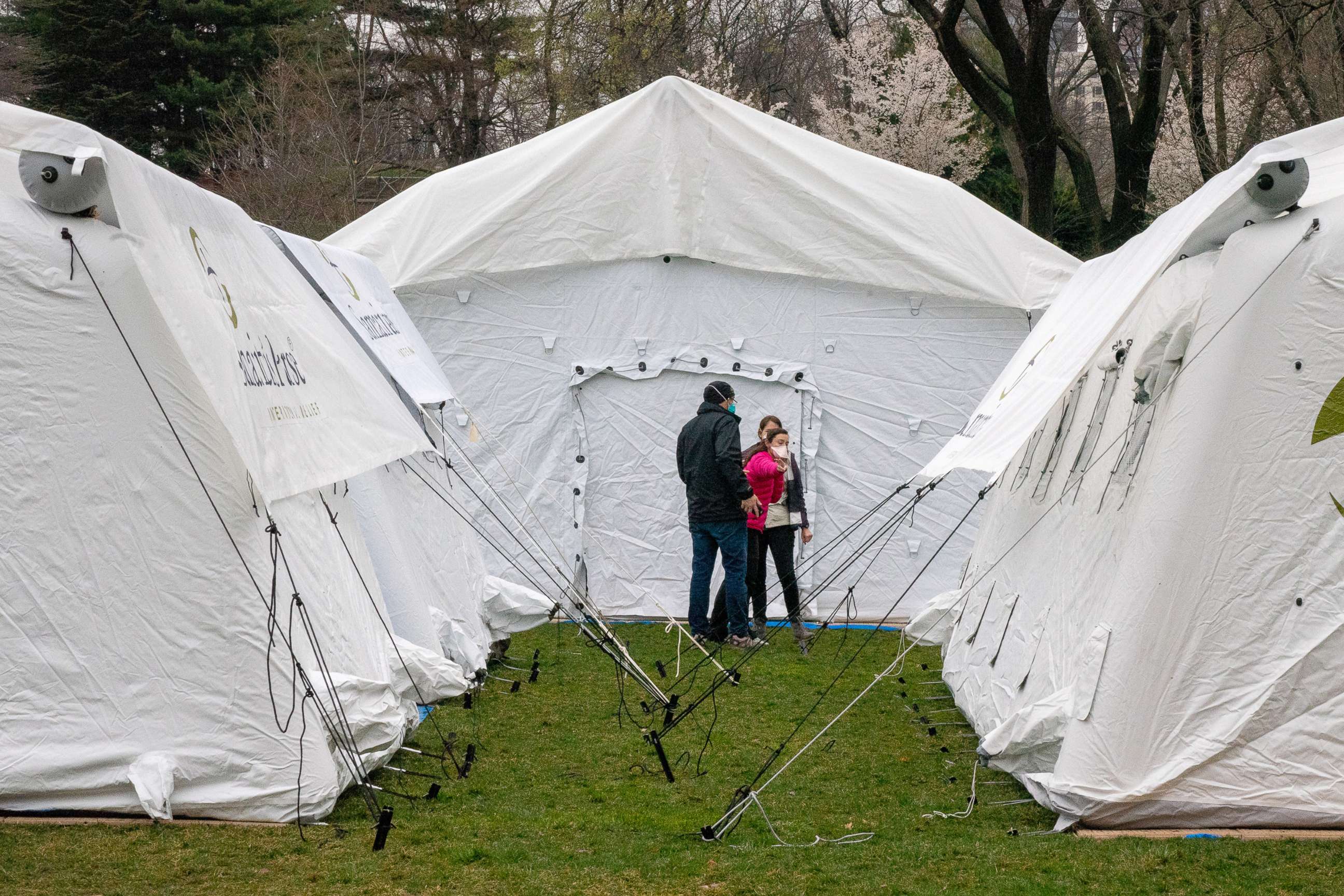
Army Corps of Engineers tackling shortages of medical sites, supplies and potentially staff
U.S. Army Lt. Gen. Todd Semonite, the commanding general of the Army Corps of Engineers spearheading an effort to build makeshift hospitals in response to the coronavirus crisis, said the scope of the initiative is "immense."
"We're looking right now at around 341 different facilities across all of the United States, very similar to the Javits Center," Semonite told ABC News Chief Anchor George Stephanopoulos Tuesday on "Good Morning America."
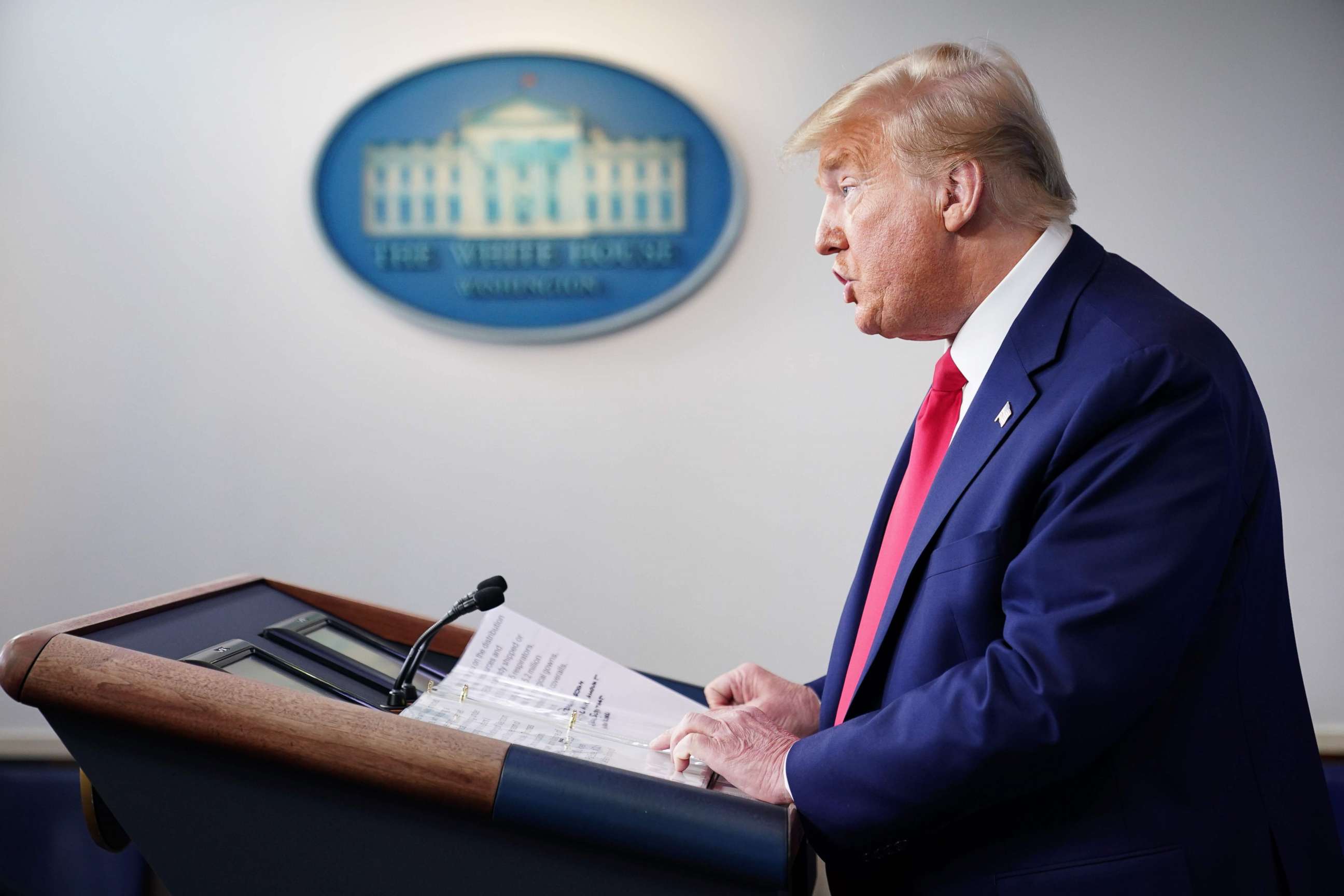
"We've got eight contracts under gear right now, people in centers constructing facilities, probably about 8,500 beds," Semonite said. "By the end of the day, we should have another five contracts awarded with somewhere around another 4,000 beds."
Semonite said they're looking at hotels and dormitories as well as large, open spaces like convention centers, as potential sites. Some will house COVID-19 patients and some that will treat all other patients.
"Our thought was to make it extremely simple," he added. "Find an existing facility that already has all the codes, has heat, has water, has I.T., has parking lots, and then just put in whatever we can like a hospital inside of that."
The Army Corps of Engineers is working in lockstep with the Federal Emergency Management Agency, the Department of Health and Human Services, as well as local governments, Semonite said.
What to know about coronavirus:
- How it started and how to protect yourself: coronavirus explained
- What to do if you have symptoms: coronavirus symptoms
- Tracking the spread in the US and Worldwide: coronavirus map
ABC News' Ben Gittleson, Jordyn Phelps, Conor Finnegan and Mariam Khan contributed to this report.
